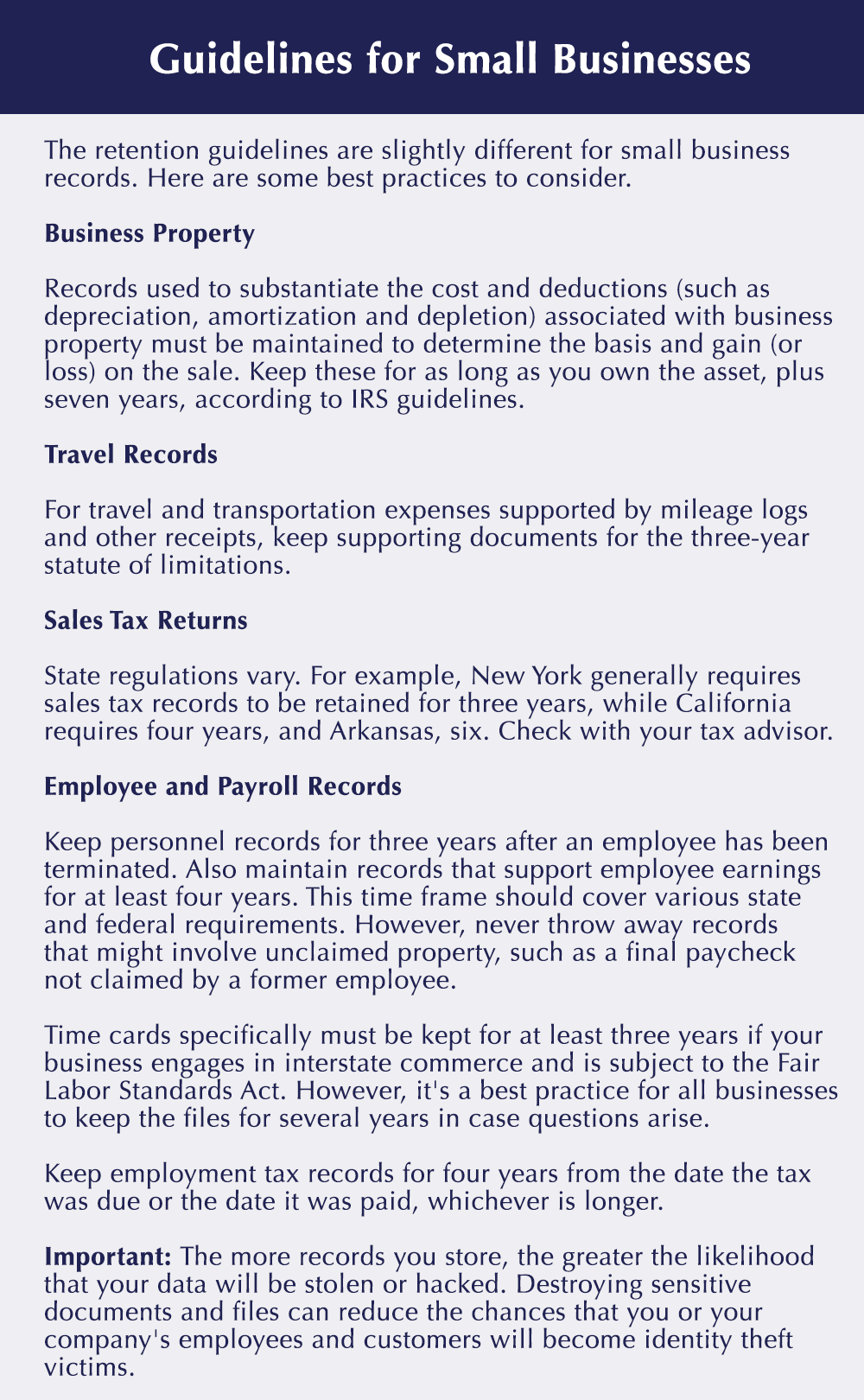Federal Tax Records
Most tax advisors recommend that you retain copies of your finished tax returns indefinitely to prove that you actually filed. Even if you don’t keep the returns indefinitely, hold onto them for at least six years after they’re due or filed, whichever is later.
It’s a good idea to keep records that support items shown on your individual tax return until the statute of limitations runs out — generally, three years from the due date of the return or the date you filed, whichever is later. Examples of supporting documents include canceled checks and receipts for alimony payments, charitable contributions, mortgage interest payments and retirement plan contributions. You can also file an amended tax return during this time frame if you missed a deduction, overlooked a credit or misreported income.
Which records can you throw away today? You can generally throw out records for the 2015 tax year, for which you filed a return in 2016.
You’re not necessarily safe from an IRS audit after three years, however. There are some exceptions to the three-year rule. For example, if the IRS has reason to believe your income was understated by 25 percent or more, the statute of limitations for an audit increases to six years. Or, if there’s suspicion of fraud or you don’t file a tax return at all, there’s no time limit for the IRS to launch an inquiry.
In addition, records that support figures affecting multiple years, such as carryovers of charitable deductions or casualty losses for federal disasters, need to be saved until the deductions no longer have effect, plus seven years, according to IRS instructions.
There are also some cases when taxpayers get more than the usual three years to file an amended return. For example, you have up to seven years to take deductions for bad debts or worthless securities, so don’t toss out records that could result in refund claims for those items.
State Tax Records
The previous guidelines are all geared toward complying with federal tax obligations. Ask your tax advisor how long you should keep your records for state tax purposes, because some states have different statutes of limitations for auditing tax returns.
Plus, if you’ve been audited by the IRS, states generally have the right to resolve their own issues related to that tax year within a year of the federal audit’s completion. So, hold on to all tax records related to an IRS audit for a year after it’s completed.
Essential Personal Records
Your files probably contain more than just tax information. Certain essential documents should be kept indefinitely. Examples include:
- Birth and death certificates,
- Marriage licenses and divorce decrees,
- Social Security cards, and
- Military discharge papers.
These should be kept in a safe location, such as a locked file cabinet or safety deposit box. If stolen, essential documents can be used to steal your identity. In turn, a stolen identity can be used to file for bogus tax refunds or apply for credit under your name.
Bills and Receipts
In general, it’s OK to shred most bills — like phone bills or credit card statements — when your payment clears your bank account or at year end. However, if a bill or receipt supports an item on your tax return, follow the tax guidance above.
If you purchase a big-ticket item — like jewelry, furniture or a computer — keep the bill for as long as you have the item. You never know if you’ll need to substantiate an insurance claim in the event of loss or damage.
Real Estate Records
Keep your real estate records for as long as you own the property, plus three years after you dispose of it, and report the transaction on your tax return. Throughout ownership, keep records of the purchase, as well as receipts for home improvements, relevant insurance claims and documents relating to refinancing.
These documents help prove your adjusted basis in the home, which is needed to figure any taxable gain at the time of sale. They can also support calculations for rental property or home office deductions.
Investment Account Statements
To accurately report taxable events involving stocks and bonds, you must maintain detailed records of purchases and sales. These records should include dates, quantities, prices, and dividend reinvestment and investment expenses, such as brokers’ fees. It’s a good idea to keep these records for as long as you own the investments, plus until the expiration of the statute of limitations for the relevant tax returns.
Likewise, the IRS requires you to keep copies of Forms 8606, 5498 and 1099-R until all the money is withdrawn from your IRAs. With Roth IRAs, it’s more important than ever to hold onto all IRA records pertaining to contributions and withdrawals in case you’re ever questioned.
If an account is closed, treat IRA records with the same rules that apply to stocks and bonds. Don’t dispose of any ownership documentation until the statute of limitations expires.
Got Questions?
Before you clear your files of old financial records, discuss the records retention requirements with your tax advisor. You don’t want to be caught empty-handed if an IRS or state tax auditor contacts you. Call or email us for advice, 434.296.2156 or info@hwllp.cpa.

© Copyright 2019 Thomson Reuters. All rights reserved. Republication or redistribution of Thomson Reuters content, including by framing or similar means, is prohibited without the prior written consent of Thomson Reuters. Thomson Reuters and the Kinesis logo are trademarks of Thomson Reuters and its affiliated companies.
Disclaimer of Liability
Our firm provides the information in this e-newsletter for general guidance only and does not constitute the provision of legal advice, tax advice, accounting services, investment advice, or professional consulting of any kind. The information provided herein should not be used as a substitute for consultation with professional tax, accounting, legal, or other competent advisers. Before making any decision or taking any action, you should consult a professional adviser who has been provided with all pertinent facts relevant to your particular situation. Tax articles in this e-newsletter are not intended to be used, and cannot be used by any taxpayer, for the purpose of avoiding accuracy-related penalties that may be imposed on the taxpayer. The information is provided “as is,” with no assurance or guarantee of completeness, accuracy, or timeliness of the information, and without warranty of any kind, express or implied, including but not limited to warranties of performance, merchantability, and fitness for a particular purpose.
Blog
Nonprofit Insights

